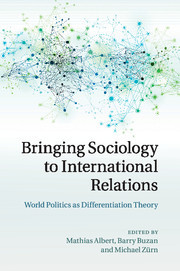Bringing Sociology to International Relations World Politics as Differentiation Theory
Coordonnateurs : Albert Mathias, Buzan Barry, Zürn Michael

Barry Buzan is Emeritus Professor of International Relations at the London School of Economics and Political Science (formerly Montague Burton Professor), and honorary professor at Copenhagen and Jilin Universities. In 1998 he was elected a Fellow of the British Academy. He has written, co-authored or edited over twenty books, written or co-authored more than one hundred and thirty articles and chapters, and lectured, broadcast or presented papers in over twenty countries. Among his books are: People, States and Fear: The National Security Problem in International Relations (1983, revised 2nd edition 1991); The Logic of Anarchy: Neorealism to Structural Realism (1993, with Charles Jones and Richard Little); Security: A New Framework for Analysis (1998, with Ole Wæver and Jaap de Wilde); International Systems in World History: Remaking the Study of International Relations (2000, with Richard Little); Regions and Powers: The Structure of International Security (2003, with Ole Wæver); From International to World Society? English School Theory and the Social Structure of Globalisation (2004); The Evolution of International Security Studies (2009, with Lene Hansen) and Non-Western International Relations Theory (2010, co-edited with Amitav Acharya). Work in progress includes The Global Transformation: The 19th Century and the Making of Modern International Relations (2013, with George Lawson).
Michael Zürn is Professor of Political Science at Free University Ber
Date de parution : 04-2015
Ouvrage de 294 p.
15.7x23 cm
Disponible chez l'éditeur (délai d'approvisionnement : 14 jours).
Prix indicatif 39,35 €
Ajouter au panierDate de parution : 10-2013
Ouvrage de 292 p.
15.8x23.5 cm
Disponible chez l'éditeur (délai d'approvisionnement : 14 jours).
Prix indicatif 105,49 €
Ajouter au panier


